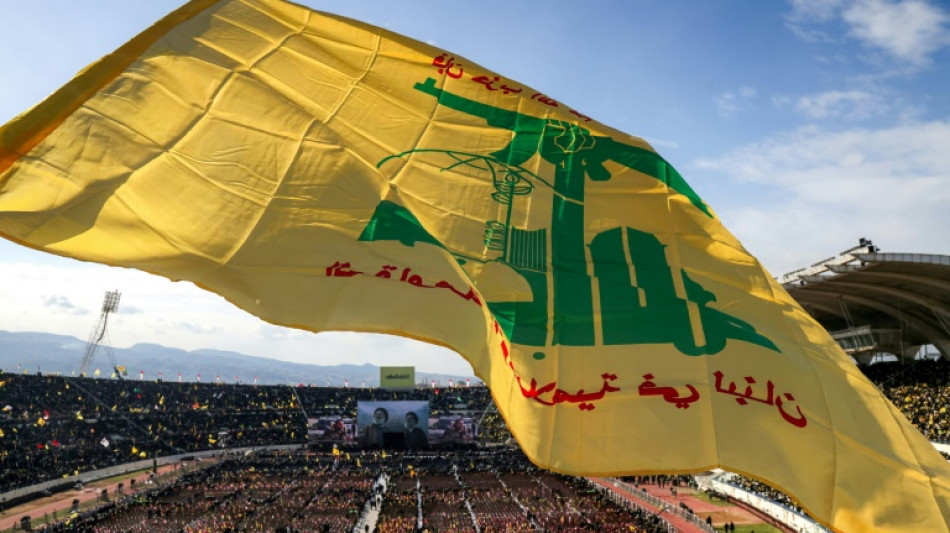
-
 Nate Bargatze to host Emmys: organizers
Nate Bargatze to host Emmys: organizers
-
US Fed Chair warns of 'tension' between employment, inflation goals

-
 Trump touts trade talks, China calls out tariff 'blackmail'
Trump touts trade talks, China calls out tariff 'blackmail'
-
US judge says 'probable cause' to hold govt in contempt over deportations

-
 US eliminates unit countering foreign disinformation
US eliminates unit countering foreign disinformation
-
Germany sees 'worrying' record dry spell in early 2025

-
 Israel says 30 percent of Gaza turned into buffer zone
Israel says 30 percent of Gaza turned into buffer zone
-
TikTok tests letting users add informative 'Footnotes'

-
 Global uncertainty will 'certainly' hit growth: World Bank president
Global uncertainty will 'certainly' hit growth: World Bank president
-
EU lists seven 'safe' countries of origin, tightening asylum rules

-
 Chelsea fans must 'trust' the process despite blip, says Maresca
Chelsea fans must 'trust' the process despite blip, says Maresca
-
Rebel rival government in Sudan 'not the answer': UK

-
 Prague zoo breeds near-extinct Brazilian mergansers
Prague zoo breeds near-extinct Brazilian mergansers
-
Macron to meet Rubio, Witkoff amid transatlantic tensions

-
 WTO chief says 'very concerned' as tariffs cut into global trade
WTO chief says 'very concerned' as tariffs cut into global trade
-
Sports bodies have 'no excuses' on trans rules after court ruling: campaigners

-
 Zverev joins Shelton in Munich ATP quarters
Zverev joins Shelton in Munich ATP quarters
-
The Trump adviser who wants to rewrite the global financial system

-
 US senator travels to El Salvador over wrongly deported migrant
US senator travels to El Salvador over wrongly deported migrant
-
UN watchdog chief says Iran 'not far' from nuclear bomb

-
 Trump says 'joke' Harvard should be stripped of funds
Trump says 'joke' Harvard should be stripped of funds
-
Macron vows punishment for French prison attackers
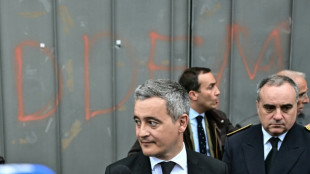
-
 Canada central bank holds interest rate steady amid tariffs chaos
Canada central bank holds interest rate steady amid tariffs chaos
-
Rubio headed to Paris for Ukraine war talks
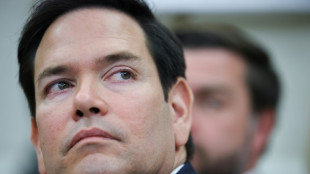
-
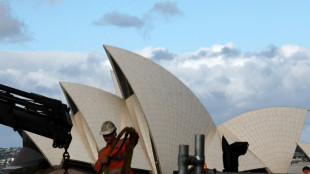 Australian PM vows not to bow to Trump on national interest
Australian PM vows not to bow to Trump on national interest
-
New attacks target France prison guard cars, home
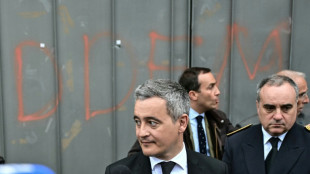
-
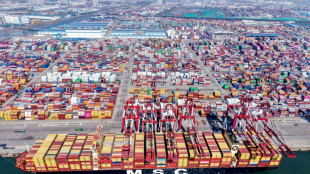 Global trade uncertainty could have 'severe negative consequences': WTO chief
Global trade uncertainty could have 'severe negative consequences': WTO chief
-
Google facing £5 bn UK lawsuit over ad searches: firms

-
 Onana to return in goal for Man Utd against Lyon: Amorim
Onana to return in goal for Man Utd against Lyon: Amorim
-
Tiktok bans user behind Gisele Pelicot 'starter kit' meme
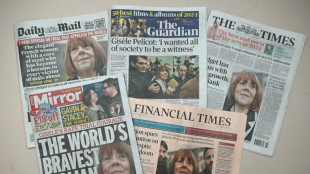
-
 'Put it on': Dutch drive for bike helmets
'Put it on': Dutch drive for bike helmets
-
China's Xi meets Malaysian leaders, vows to 'safeguard' Asia allies
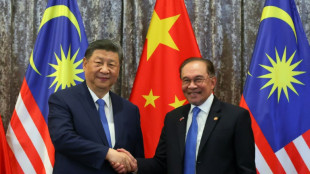
-
 France urges release of jailed Russian journalists who covered Navalny
France urges release of jailed Russian journalists who covered Navalny
-
Gabon striker Boupendza dies after 11th floor fall
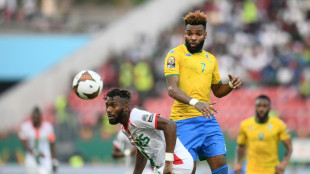
-
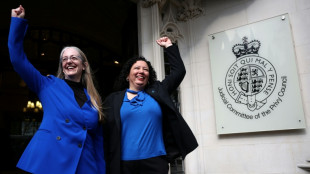 UK top court rules definition of 'woman' based on sex at birth
UK top court rules definition of 'woman' based on sex at birth
-
PSG keep Champions League bid alive, despite old ghosts reappearing

-
 Stocks retreat as US hits Nvidia chip export to China
Stocks retreat as US hits Nvidia chip export to China
-
China's Xi meets Malaysian leaders in diplomatic charm offensive
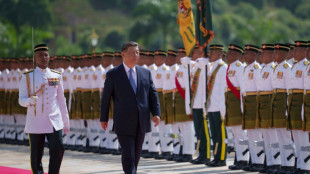
-
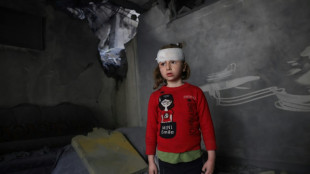 Israel says no humanitarian aid will enter Gaza
Israel says no humanitarian aid will enter Gaza
-
Anxiety clouds Easter for West Bank Christians
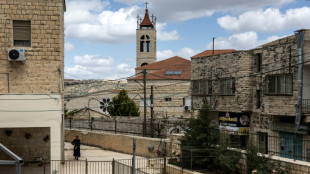
-
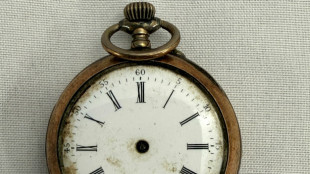 Pocket watch found on Titanic victim to go on sale in UK
Pocket watch found on Titanic victim to go on sale in UK
-
UK top court rules definition of 'a woman' based on sex at birth
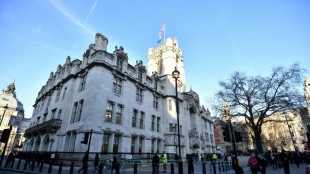
-
 All Black Ioane to join Leinster on six-month 'sabbatical'
All Black Ioane to join Leinster on six-month 'sabbatical'
-
Barca suffer morale blow in Dortmund amid quadruple hunt

-
 China tells Trump to 'stop threatening and blackmailing'
China tells Trump to 'stop threatening and blackmailing'
-
Iran FM says uranium enrichment 'non-negotiable' after Trump envoy urged halt
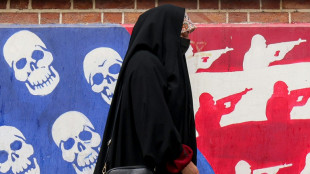
-
 Automakers hold their breath on Trump's erratic US tariffs
Automakers hold their breath on Trump's erratic US tariffs
-
Cycling fan admits throwing bottle at Van der Poel was 'stupid'

-
 Troubled Red Bull search for path back to fast lane
Troubled Red Bull search for path back to fast lane
-
China's forecast-beating growth belies storm clouds ahead: analysts


Disarming Lebanon's Hezbollah no longer inconceivable: analysts
The once unthinkable disarmament of Hezbollah could finally be within reach, as the United States pushes Lebanon to act and applies pressure to the group's backer Iran over its nuclear programme, analysts said.
Hezbollah was left badly weakened by more than a year of hostilities with Israel, beginning with the group's campaign of rocket fire at its arch-foe in support of ally Hamas, and culminating in a major Israeli bombing campaign and ground incursion into Lebanon.
In the months after the war, which devastated parts of the country and killed many of the movement's top leaders, Lebanon elected a president and formed a government after a more than two-year vacuum as the balance of power shifted.
The war "clearly changed the situation on ground in Lebanon", said David Wood from the International Crisis Group.
"It's conceivable to think that Hezbollah could move towards disarmament and potentially even participate in that process willingly," Wood told AFP.
Hezbollah was the only group that refused to disarm after Lebanon's 1975-1990 civil war. Bolstered by an arsenal once considered more powerful than that of the Lebanese army, it long presented itself as the country's best line of defence against Israeli aggression.
But both its stockpiles and its senior leadership were sapped by the conflict, with longtime leader Hassan Nasrallah among the commanders killed.
Under a November 27 truce, Hezbollah was to withdraw its fighters to the north of Lebanon's Litani River and dismantle any remaining military infrastructure in the south, while the Lebanese army was to deploy in the area.
Israel was meant to withdraw its troops, but it still remains in five points it deems "strategic" and conducts regular strikes on what it says are mostly Hezbollah targets.
A source close to Hezbollah told AFP that the group had ceded to the Lebanese army around 190 of its 265 military positions identified south of the Litani.
Visiting US deputy special envoy for the Middle East Morgan Ortagus, who is spearheading Washington's campaign to pressure the Lebanese government to disarm Hezbollah, this month said it should happen "as soon as possible".
Lebanese President Joseph Aoun, who has pledged a state monopoly on bearing arms, has said the issue requires national dialogue.
- 'Inevitable'? -
Hezbollah -- which was established after a 1982 Israeli invasion -- has already agreed to significant political compromises this year, including declining to stand in the way of the selection of the new president.
Hanin Ghaddar from The Washington Institute told AFP that Hezbollah's disarmament was "inevitable".
The only alternative to the Lebanese state disarming the group "is that Israel is going to do it" militarily, said Ghaddar, a critic of the group.
Retired south Lebanon intelligence chief General Ali Shahrour said after Hezbollah's recent setbacks "it is certainly not in its interest to engage in any war (with Israel) or confrontation against the (Lebanese) state" in opposition to disarmament.
He said talks between Hezbollah's patron Iran and the United States on curbing Tehran's nuclear programme would impact Iran-backed groups across the region.
Those negotiations kicked off last weekend, with US President Donald Trump threatening military action against Iran if they failed to reach a deal.
Several Hezbollah officials have said the group is ready for dialogue on Lebanon's defence strategy, including the issue of the group's weapons, but is not prepared to surrender them now.
Ghaddar said current Hezbollah leader Naim Qassem and the chief of its parliamentary bloc, Mohammed Raad, likely wanted "to play the time game" to avoid disarmament.
Hezbollah wants "to survive" as a military institution, she said, adding any internal divisions would centre on "how to go about it".
Several experts said Israel's ongoing troop presence along the border played into the group's hands.
"The Israelis are certainly providing Hezbollah with justification to retain its weapons," said Shahrour, the retired intelligence official.
- US-Iran talks -
The source close to Hezbollah, who spoke on condition of anonymity, said Lebanon's army lacked "the military capability to defend the south" against Israel.
They accused Washington of insisting Hezbollah's rockets be destroyed, rather than confiscated, in order to keep Lebanon's army weak.
The Crisis Group's Wood said Beirut's options included dismantling Hezbollah's military infrastructure or integrating its weapons and fighters into the regular army.
The "safest approach" is "to move cautiously and take time", he said.
"It is possible that Iran would seek to trade its support for regional allies, including Hezbollah, for concessions in negotiations with the US," Wood added.
Karim Bitar, a lecturer in Middle East Studies at the Sciences Po university in Paris, said the issue of what should come first -- Israel's full withdrawal or Hezbollah's disarmament -- was "a chicken and egg situation".
Hezbollah would likely surrender some heavy weapons while denying responsibility for arms held by individuals aligned with the group, he told AFP.
"In the absence of an Iranian green light, I doubt that Hezbollah would willingly relinquish its weapons to the Lebanese army, even if they are offered to form an autonomous battalion within the Lebanese army," he said.
"A lot of this will depend on the US-Iranian negotiations."
H.E.Young--AMWN